The fast of Gedaliah, which we mark today, is meant to mark a break in the history of the Jewish people - the murder of Gedaliah ben Ahikam, the prefect of Judah in the days following the destruction of the First Temple, which led to the end of Jewish settlement during the First Temple period in the Land of Israel.
Fasting is one of four days of fasting and mourning for the destruction of the Temple and going into exile: Tisha B'Av, the day on which the two Temples were destroyed; 10 Tevet, the day the siege of Jerusalem began; 17 Tammuz, the day the city walls were breached; And finally - the fast of Gedalya.
The fast of Gedaliah falls at a time when Judaism is marked by soul-searching, asking for forgiveness and justice. It begins with the arrival of the month of Elul, the month of mercy and forgiveness, and continues on Rosh Hashanah, the Day of Judgment, when the ten days of repentance that bring us to Yom Kippur begin. Today, too, this day expresses the connection in consciousness and memory between religion and state, between the religious day and the national crisis we all experienced 50 years ago, with the outbreak of the Yom Kippur War.
Rosh Hashanah and Yom Kippur also have significance in Islam, whose origins and roots are found in Judaism. The Ashura fast on the tenth day of the month of Muharram (the first month of the Islamic calendar) was the first fast ordered by the Prophet Muhammad. He hoped to recruit the Jews of the Arabian Peninsula to his side, but when they refused to accept him as a prophet, he canceled the Ashura fast and the conception of the year (adding a month to the calendar once every few years), thus severing the Muslim calendar from the Jewish one, and also causing Muslim holidays not to occur at a fixed time of year.
Ashura remains a day of importance, especially in the Shiite world, commemorating the devastation experienced by the Shiites with the assassination of their leader, Imam Hussein bin Ali, grandson of the Prophet Muhammad and son of the fourth Caliph Ali bin Abi Taleb. In recent decades, and especially in the shadow of the revolution in Iran, it has turned from a day of mourning and soul-searching to a day of show of power and violence. It culminates in mourning processions, during which the marchers themselves whip themselves to the point of bloodshed.
On the other hand, Muslim New Year, the first day of the month of Muharram, which precedes Ashura, is not a religious holiday, although, like New Year's Day, it is a day off marked by many Muslim societies at celebrations and family events.
The month of fasting in Islam is established by Muhammad in the month of Ramadan, the ninth month of the Muslim year. According to tradition, the Prophet Muhammad received the Quran from the angel Gabriel during this month, and in those days he did not eat or drink from sunrise to the stars.
Ramadan is a month of fasting, introspection and closeness to God. It is characterized by religious "strengthening" and strict adherence to the commandments, even among those who are not perceived as "religious." However, like Ashura, Ramadan has turned over the years from a month of mercy and preaching peace among believers to a month that, for many in the Islamic world, is marked by "jihad," the holy war against infidels.
The fast of Gedaliah falls at a time when Judaism is marked by soul-searching, asking for forgiveness and justice. It begins with the arrival of the month of Elul, the month of mercy and forgiveness, and continues on Rosh Hashanah, the Day of Judgment, when the ten days of repentance that bring us to Yom Kippur begin
"Ramadan War" is one of the names in the Arab world for the Yom Kippur War, which broke out during the month of Ramadan, which then fell in October 1973. Today, however, we witness displays of violence and terror throughout the month, rooted in religious fervor that reaches a boiling point inspired by preaching and incitement by clerics.
The Shi'ite world, led by Iran, is holding Jerusalem Day on the last Friday of Ramadan, a day of hatred for Israel, in which demonstrators and clerics who address them call for the destruction of the "Zionist entity."
Islam and Judaism are closely related, and it is not for nothing that they are called the "Abrahamic religions" - what they have in common is the belief in the ancient common ancestor, Abraham. But the connection between religion and the politics of radicalization and jihad in today's Islamic world distances and creates a difficult chasm between Abraham's sons.
Wrong? We'll fix it! If you find a mistake in the article, please share with us

